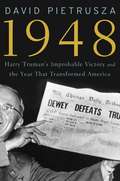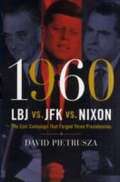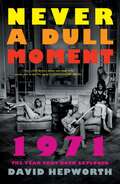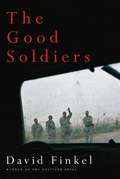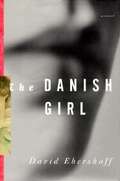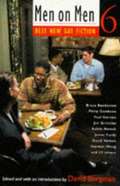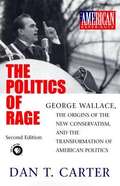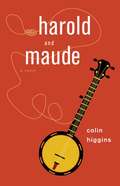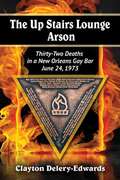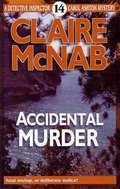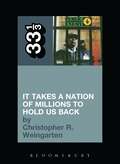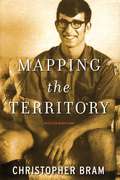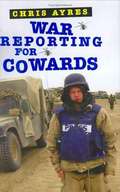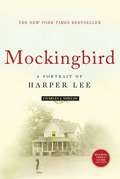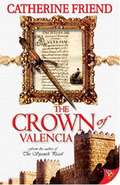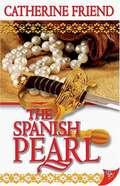- Table View
- List View
1948: Harry Truman's Improbable Victory and the Year that Transformed America
by David PietruszaThe behind-the-headline true story of Harry Truman's stunning upset! Everyone knows the iconic news photo of jubilant underdog Harry Truman brandishing a copy of the Chicago Tribune proclaiming "DEWEY DEFEATS TRUMAN. " David Pietrusza goes backstage to explain how it happened, placing the brutal political battle in the context of an erupting Cold War and America's exploding storms over civil rights and domestic communism. Pietrusza achieves for 1948's presidential race what he previously did in his acclaimed 1960--LBJ vs. JFK vs. Nixon: bringing history to life and intrigue readers with tales of high drama while simultaneously presenting the issues, personalities, and controversies of this pivotal era with laser-like clarity.
1960--LBJ vs. JFK vs. Nixon: The Epic Campaign That Forged Three Presidencies
by David PietruszaIt was the election that would ultimately give America "Camelot" and its tragic aftermath, a momentous contest when three giants who each would have a chance to shape the nation battled to win the presidency. Award-winning author David Pietrusza does here for the 1960 presidential race what he did in his previous book, 1920: the Year of the Six Presidents--which Kirkus Reviews selected as one of their Best Books of 2007. Until now, the most authoritative study of the 1960 election was Theodore White's Pulitzer Prize-winning The Making of the President, 1960. But White, as a trusted insider, didn't tell all. Here's the rest of the story, what White could never have known, nor revealed. Finally, it's all out--including JFK's poignant comment on why LBJ's nomination as vice president would be inconsequential: "I'm 43 years old. I'm not going to die in office. " Combining an engaging narrative with exhaustive research, Pietrusza chronicles the pivotal election of 1960, in which issues of civil rights and religion (Kennedy was only the second major-party Roman Catholic candidate ever) converged. The volatile primary clash between Senate Majority leader LBJ and the young JFK culminated in an improbable fusion ticket. The historic, legendary Kennedy-Nixon debates followed in its wake. The first presidential televised debates, they forever altered American politics when an exhausted Nixon was unkempt and tentative in their first showdown. With 80 million viewers passing judgment, Nixon's poll numbers dropped as the charismatic Kennedy's star rose. Nixon learned his lesson--resting before subsequent debates, reluctantly wearing makeup, and challenging JFK with a more aggressive stance--but the damage was done. There's no one better to convey the drama of that tumultuous year than Pietrusza. He has 1,000 secrets to spill; a fascinating cast of characters to introduce (including a rogue's gallery of hangers-on and manipulators); and towering historical events to chronicle. And all of it is built on painstaking research and solid historical scholarship. Pietrusza tracks down every lead to create a winning, engaging, and very readable account. With the 2008 elections approaching, politics will be on everyone's mind, and 1960: LBJ vs. JFK vs. Nixon will transform the way readers see modern American history. A sampling of what Theodore White couldn't chronicle--and David Pietrusza does: · Richard Nixon's tempestuous Iowa backseat blowup, and his bizarre Election Day road trip · The full story of a sympathetic call from JFK to Coretta Scott King · John Ehrlichman's spy missions on the Nelson Rockefeller and Democratic camps · The warnings before Election Day that Chicago's mayor Daley would try to fix the race's outcome · JFK's amphetamine-fueled debate performance
Never a Dull Moment: 1971--The Year That Rock Exploded
by David HepworthDavid Hepworth was twenty-one in 1971 and has been writing and broadcasting about music ever since. In this entertaining and provocative book, he argues that 1971 saw an unrepeatable surge of musical creativity, technological innovation, naked ambition and outrageous good fortune that combined to produce music that still crackles with relevance today. There’s a story behind every note of that music. From the electric blue fur coat David Bowie wore when he first arrived in America in February to Bianca’s neckline when she married Mick Jagger in Saint-Tropez in May, from the death of Jim Morrison in Paris in July to the reemergence of Bob Dylan at Madison Square Garden in August, from the soft launch of Carole King’s Tapestry in California in February to the sensational arrival of Led Zeppelin’s “Stairway To Heaven” in London in November, Hepworth’s forensic sweep takes in all the people, places and events that helped make 1971 rock’s unrepeatable year.
The Good Soldiers
by David FinkelIt was the last-chance moment of the war. In January 2007, President George W. Bush announced a new strategy for Iraq. He called it the surge. Many listening tonight will ask why this effort will succeed when previous operations to secure Baghdad did not. "Well, here are the differences," he told a skeptical nation. Among those listening were the young, optimistic army infantry soldiers of the 2-16, the battalion nicknamed the Rangers. About to head to a vicious area of Baghdad, they decided the difference would be them. Fifteen months later, the soldiers returned home forever changed. Pulitzer Prize-winning Washington Post reporter David Finkel was with them in Bagdad, and almost every grueling step of the way. What was the true story of the surge? And was it really a success? Those are the questions he grapples with in his remarkable report from the front lines. Combining the action of Mark Bowden's Black Hawk Down with the literary brio of Tim O'Brien's The Things They Carried, The Good Soldiers is an unforgettable work of reportage. And in telling the story of these good soldiers, the heroes and the ruined, David Finkel has also produced an eternal tale-- not just of the Iraq War, but of all wars, for all time.
The Danish Girl: A Novel
by David EbershoffAuthor's Note: This is a work of fiction loosely inspired by the case of Einar Wegener and his wife. I wrote the novel in order to explore the intimate space that defined their unusual marriage, and that space could only come to life through conjecture and speculation and the running of imagination. Some important facts about Einar's actual transformation lie in these pages, but the story, as recounted here with its details of place and time and language and interior life, is an invention of my imagination. In early 1931 when the news broke that a man had changed his gender, newspapers around the world ran accounts of Einar Wegener's remarkable life. (It is interesting to note that Lili Elbe herself leaked the story to the press, and wrote some stories about herself, including her own obituary, under a pseudonym.) Many of those articles were helpful in writing this novel, especially those in Politiken and other Danish newspapers. Another indispensable source was Lili Elbe's diaries and correspondence, which Niels Hoyer edited and published as Man Into Woman. Those journal entries and letters provided critical factual details of Einar's evolution, especially regarding Lili's first visit to Wegener's studio, Einar's mysterious bleeding and physical decline, and his journey to and stay at the Dresden Municipal Women's Clinic. The passages in my book that deal with these incidents are especially indebted to Hoyer's assemblage of Lili Elbe's original words. Nonetheless, I have changed so many elements of Einar Wegener's story that the characters in these pages are entirely fictional. The reader should not look to this novel for very many biographical details of Einar Wegener's life, and no other character in the novel has any relation to an actual person, living or dead.
Men On Men 6: Best New Gay Fiction
by David BergmanSensual masseurs and seductive lawnboys. Italian sons and Trinidadian husbands. Pumped-up porn stars and diced-up drag queens. Elderly widowers who fall in love and create scandal. Generation Xers who envy the dying disco generation in Provincetown. Straight sons who comfort the partners of their gay fathers.<P> Since its inception over a decade ago, the Men on Men series has consistently offered gay male writers a forum to liberate and legitimize gay fiction as some of the freshest, most original, and incisive writing in America today. Now, in Men on Men 6 ,twenty writers-well-known names and exciting new voices of uncommon skill and urgency-present powerful stories that turn in new directions with a tremendous diversity of style, subject matter, and cultural identity. From wry or romantic "boy-meets-boy" stories to profound reflections on love, death, and family, this extraordinary collection of today's best new gay fiction transcends any narrowly defined genre and showcases the literature of men loving men-work that is superb by any critical measure.
The Politics of Rage: George Wallace, the Origins of the New Conservatism, and the Transformation of American Politics
by Dan T. CarterCombining biography with regional and national history, Dan T. Carter chronicles the dramatic rise and fall of George Wallace, a populist who abandoned his ideals to become a national symbol of racism, and later begged for forgiveness. In The Politics of Rage, Carter argues persuasively that the four-time Alabama governor and fourtime presidential candidate helped to establish the conservative political movement that put Ronald Reagan in the White House in 1980 and gave Newt Gingrich and the Republicans control of Congress in 1994. In this second edition, Carter updates Wallace's story with a look at the politician's death and the nation's reaction to it and gives a summary of his own sense of the legacy of "the most important loser in twentieth-century American politics."
Women of Ideas: And What Men Have Done to Them
by Dale SpenderThis is a classic reference work and, from beginning to end, a provocative and stimulating read. With characteristic energy, humour and learning, Dale Spender has dug into the hidden past and uncovered shining examples of women's creativity and intellectual prowess which had been suppressed or stolen by men. Men have removed women from literary and historical records and deprived women of the knowledge of their intellectual heritage. Now this lost history of women's thought is set out for all to see.
The Best Lawyer In A One-Lawyer Town
by Dale BumpersAutobiography of the former Arkansas governor and legislator.
Harold and Maude
by Colin HigginsNineteen-year-old Harold Chasen is obsessed with death. He fakes suicides to shock his self-obsessed mother, drives a hearse, and attends funerals of complete strangers. Seventy-nine-year-old Maude Chardin, on the other hand, adores life. She liberates trees from city sidewalks and transplants them to the forest, paints smiles on the faces of church statues, and "borrows" cars to remind their owners that life is fleeting-- here today, gone tomorrow! A chance meeting between the two turns into a madcap, whirlwind romance, and Harold learns that life is worth living, and how to play the banjo. Harold and Maude started as Colin Higgins's master's thesis at UCLA film school before being made into the 1971 film directed by Hal Ashby. The quirky, dark comedy gained a loyal cult following, and in 1997 it was selected for inclusion on the National Film Registry at the Library of Congress. Higgins's novelization was released with the original film but has been out of print for more than thirty years. Fans who have seen the movie dozens of times will find this a valuable companion, as it gives fresh elements to watch for and answers many of the film's unresolved questions.
The Up Stairs Lounge Arson: Thirty-two Deaths in a New Orleans Gay Bar, June 24, 1973
by Clayton Delery-EdwardsOn June 24, 1973, a fire in a New Orleans gay bar killed 32 people. This still stands as the deadliest fire in the city's history. Though arson was suspected, and though the police identified a likely culprit, no arrest was ever made. Additionally, government and religious leaders who normally would have provided moral leadership at a time of crisis were either silent or were openly disdainful of the dead, most of whom were gay men. Based upon review of hundreds of primary and secondary sources, including contemporary news accounts, interviews with former patrons of the lounge, and the extensive documentary trail left behind by the criminal investigations, The Up Stairs Lounge Arson tells the story of who frequented this bar, what happened on the day of the fire, what course the investigations took, why an arrest was never made, and what the lasting effects of the fire have been.
Accidental Murder (A Detective Inspector Carol Ashton Mystery)
by Claire McnabWhen people with no obvious connections to each other are dying in what appear to be legitimate accidents -- a fall down the stairs, a single-vehicle car crash, a drowning in a hot tub -- nothing seems amiss. Until, Detective Inspector Carol Ashton receives a call from a private investigator who works for a number of insurance companies. Recently, several large life insurance policy pay outs seem questionable but there is no proof of wrongdoing. As Carol begins an investigation of the completely unrelated deaths, she realizes this could be the toughest case of her career and perhaps, one impossible to solve.
A Density Of Souls
by Christopher RiceSet in New Orleans; four high school friends torn apart by secrets and violence; five years later more secrets discovered.
Light Before Day
by Christopher RiceFrom the book jacket: In California's Central Valley, an explosion of white-hot methamphetamine rips through a trailer, its blinding flash killing a dedicated schoolteacher in search of a student whose life is in danger. . . . In West Hollywood, a young reporter discovers that a Marine helicopter pilot visited the gay ghetto just days before he sent his chopper spiraling into the Pacific Ocean .... And in the wilds of California's Coast Ranges, a mercilessly angry young woman pursues the mythic killer she believes has murdered her mother. . . . So begins Light Before Day, a dark new thriller of revenge and sexual obsession from New York Times best-selling author Christopher Rice.
Public Enemy's It Takes a Nation of Millions to Hold Us Back (33 1/3 Ser. #71)
by Christopher R. WeingartenChristopher R. Weingarten provides a thrilling account of how the Bomb Squad produced such a singular-sounding record: engineering, sampling, scratching, constructing, deconstructing, reconstructing—even occasionally stomping on vinyl that sounded too clean. Using production techniques that have never been duplicated, the Bomb Squad plundered and reconfigured their own compositions to make frenetic splatter collages; they played samples by hand together in a room like a rock band to create a “not quite right” tension; they hand-picked their samples from only the ugliest squawks and sirens.
Mapping the Territory: Selected Nonfiction
by Christopher BramNovelist Christopher Bram has been writing essays for twenty-five years. Mapping the Territory, his first collection of nonfiction, ranges through such topics as the power of gay fiction, coming out in the 1970s in Virginia, low-budget filmmaking with friends in New York, and the sexual imagination of Henry James. He describes the heady experience of seeing his novel Gods and Monsters made into an Oscar-winning movie starring Ian McKellen, Brendan Fraser, and Lynn Redgrave; and he discusses why he and his partner of thirty years don't want to get married. Bram looks both into and out of himself in these essays. He revisits the titles he read while finding himself as a gay man, and he also shows us Greenwich Village as seen from his front stoop. The book is not simply a collection of short pieces--it's an autobiography of ideas from one of today's most lively and popular novelists.
Melissa Etheridge
by Chris NicksonChris Nickson's biography of Melissa Etheridge explores the pop star's life and music. Born in Leavenworth, Kansas, Melissa Etheridge faced years of struggle and hard work to make it in the music business. But through it all, she's remained determined, and now has multiple platinum records and Grammys to her name and an original sound that's all her own. Nickson tells the whole story in this biography fans are sure to enjoy.
War Reporting for Cowards
by Chris AyresFrom the book: "Captain," I called out. -How dangerous is this going to be?" "Don't worry," he said with a straight face. "People think artillery is boring. But we kill more people than anyone else." Chris Ayres never wanted to be a war correspondent. A small-town boy, a hypochondriac, and a neat freak with an anxiety disorder, he saw journalism as a ticket to lounging by swimming pools in Beverly Hills and sipping martinis at Hollywood celebrity parties. Instead, he keeps finding himself in the wrong place at the wrong time, whether it's a few blocks from the World Trade Center on September 11 or one cubicle over from an anthrax attack at The New York Post. Then, a misunderstanding with his boss sees him transferred from Hollywood to the Middle East, where he is embedded with the Marine Corps on the front line of the Iraq War, headed straight to Baghdad with a super-absorbent camping towel, an electric toothbrush, and only one change of underwear. What follows is the worst (not to mention the first) camping trip of his life. War Reporting for Cowards is the Iraq War through the eyes of a "war virgin." After a crash course on "surviving dangerous countries" where he nearly passes out when learning how to apply a tourniquet, and a gas mask training exercise where he is repeatedly told he is "one very dead media representative," Ayres joins the Long Distance Death Dealers, a battalion of gung-ho Marines who kill more people on the battlefield than anyone else. Donning a bright blue flak jacket and helmet, he quickly makes himself the easiest target in the entire Iraqi desert. Ayres spends the invasion digging "coffin-sized" foxholes, dodging incoming mortars, fumbling for his gas mask, and, at one point, accidentally running into the path of a dozen Republican Guard tanks amid a blinding mud storm. By "bogged down" by the growing insurgency, Ayres realizes not only what the sheer terror of combat feels like, but also the visceral thrill of having won a fight for survival. In the tradition of M*A*S*H and Catch-22, War Reporting for Cowards is by turns extraordinarily honest, heartfelt, and bitterly hilarious. It is destined to become a classic of war reportage.
Mockingbird: A Portrait of Harper Lee
by Charles J. ShieldsTo Kill a Mockingbird--the twentieth century's most widely read American novel--has sold thirty million copies and still sells a million yearly. Yet despite her book's perennial popularity, its creator, Harper Lee, has become a somewhat mysterious figure. Now, after years of research, Charles J. Shields brings to life the warmhearted, high-spirited, and occasionally hardheaded woman who gave us two of American literature's most unforgettable characters--Atticus Finch and his daughter, Scout. At the center of Shields's evocative, lively book is the story of Lee's struggle to create her famous novel, but her colorful life contains many highlights--her girlhood as a tomboy in overalls in tiny Monroeville, Alabama; the murder trial that made her beloved father's reputation and inspired her great work; her journey to Kansas as Truman Capote's ally and research assistant to help report the story ofIn Cold Blood. Mockingbird--unique, highly entertaining, filled with humor and heart--is a wide-ranging, idiosyncratic portrait of a writer, her dream, and the place and people whom she made immortal.
The Crown of Valencia
by Catherine FriendEx-lovers can really mess up your life. Kate Vincent's ex, Anna, certainly does. Not only does Anna interfere in Kate's love life, but she totally screws up the world by travelling back in time to 11th century Spain and changing one crucial event. As any sane person knows, you cannot alter an event in history without altering everything that follows - but Anna has an agenda, and a score to settle. When Kate follows Anna back to the 11th century to clean up Anna's mess before she and those she loves cease to exist, she finds herself fighting not only Anna and her hired thugs, but also another woman - the woman Kate has never stopped loving.
The Spanish Pearl
by Catherine FriendWhen Kate Vincent and her partner travel to Spain, Kate is accidentally transported back in time ... way back in time ... to 1085. What does a woman like Kate do in a world of no antibiotics, no feminism, no Diet Coke? She denies it as long as possible, then sets her mind to getting home. Tricky with her now useless twenty-first century skills. Things don't go well. Kate is captured by a band of mercenary soldiers and becomes an unwitting pawn in the violent conflict between the Catholic kings and the Islamic Moors. In her struggle to stay alive and return to the future, Kate must flee exotic harems, filthy dungeons, and treacherous Moorish courts. But when a sword-brandishing woman with an astonishing secret sweeps into Kate's life, Kate is suddenly torn between two women, and between two centuries.
